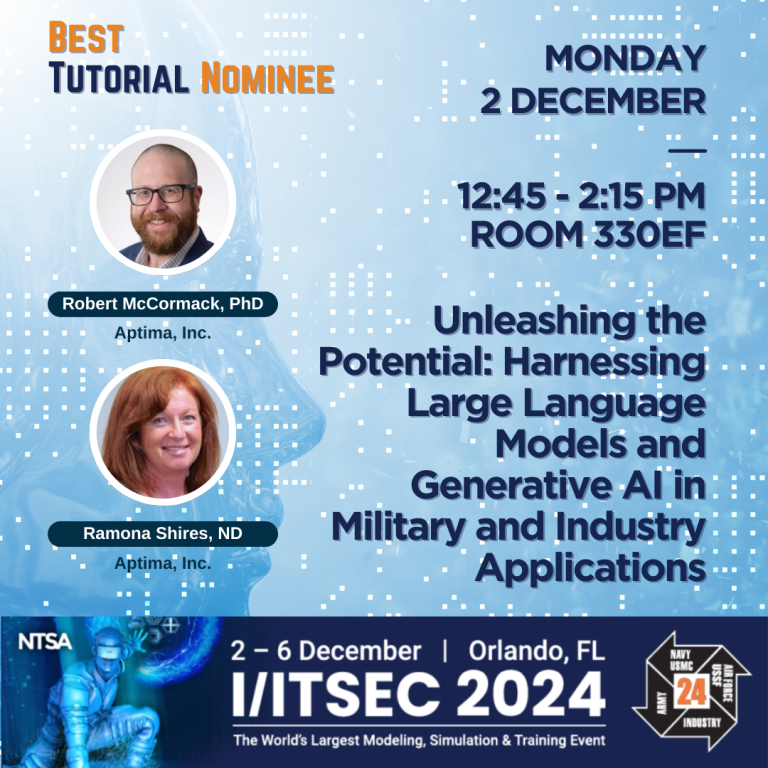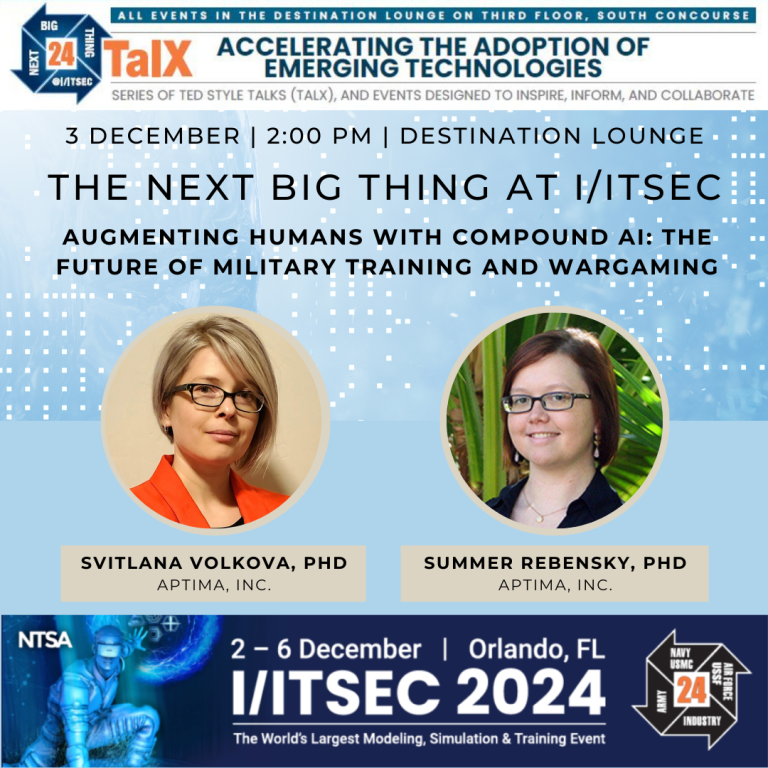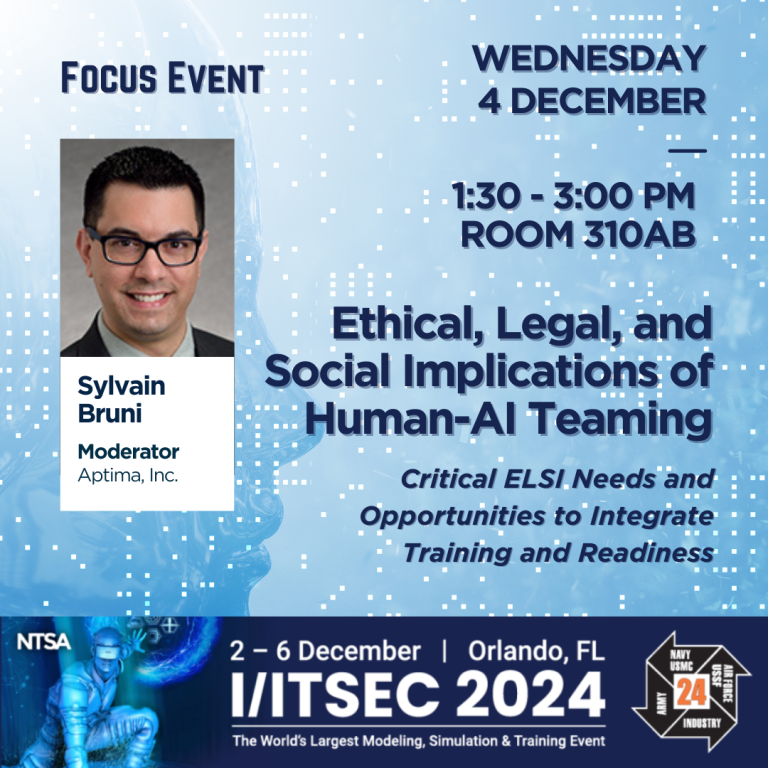
I/ITSEC 2024 is a wrap! We’ll see you in December for I/ITSEC 2025.
Human-AI Systems: Solutions for Optimized Performance and Readiness
Aptima’s mission is to optimize human performance. In the age of AI, we are harnessing the potential of these new technologies to enhance human learning through the thoughtful design and engineering of Human-AI systems by considering both the human and the AI components of that system. Aptima’s human-centered AI systems aim to augment and enhance human capabilities rather than replace them, while ensuring that these technologies align with human ethics, rights, and societal norms.
Aptima Events
TUTORIAL – BEST TUTORIAL NOMINEE
Unleashing the Potential: Harnessing Large Language Models and Generative AI in Military and Industry Applications
Monday, 2 December | 12:45 – 2:15 | Room 330EF | Add to Calendar
Speakers: Ramona Shires, ND, and Robert McCormack, Ph.D., Aptima, Inc.
This tutorial aims to explore the art and science behind utilizing Large Language Models (LLMs) and Generative AI in military and industry environments. From understanding the nuances of selecting the right LLM to crafting sophisticated prompts and overcoming implementation challenges, this tutorial provides participants with basic understanding of essential skills necessary for harnessing the power of LLMs effectively. Real-world use cases illustrate LLMs’ practical applications in military and industry settings, addressing military training analysis and design challenges and enhancing proposal development processes. Through these use cases, participants will gain insights into diverse LLM/AI applications. Finally, the tutorial addresses integrating generative AI into military training environments, acknowledging potential operational efficiency enhancements while confronting challenges such as classified environments, data security and organizational change management.
TalX: THE NEXT BIG THING AT I/ITSEC
Augmenting Humans with Compound AI: The Future of Military Training and Wargaming
Tuesday, 3 December | 2:00 | Destination Lounge | Add to Calendar
Speakers: Svitlana Volkova, Ph.D., and Summer Rebensky, Ph.D., Aptima, Inc.
This TalX unveils a groundbreaking vision of compound AI that seamlessly blends human intuition with AI, transforming military training and wargaming. We’ll explore how cutting-edge AI models, rigorously evaluated for transparency and robustness, work in concert to create immersive, adaptive experiences tailored to everyone. Witness the power of AI-generated scenarios that push the boundaries of strategic thinking. Discover how human-AI synergy could redefine operational readiness. Join us on a journey to the frontiers of technology, where the fusion of human creativity and AI capabilities promises to unlock unprecedented levels of performance and decision making across military operations.
FOCUS EVENT
Ethical, Legal, and Social Implications of Human-AI Teaming: Critical ELSI Needs and Opportunities to Integrate Training and Readiness
Wednesday, 4 December | 1:30 – 3:00 PM | Room 310AB | Add to Calendar
Moderator: Sylvain Bruni, Aptima, Inc.
The NATO SG-278 study on Cognitive Augmentation for Military Applications identified a series of challenges and opportunities related to the ethical, legal, and social implications (ELSI) of leveraging new forms of training and operational support (including neurostimulation, neuroaugmentation, and human-AI teaming). This topic is under-addressed and requires more depth and visibility in our community, as evidenced by questions and requests from the 2023 I/ITSEC conference when SG-278 was briefed. This vast new field is actively being researched in several critical domains, such as healthcare, transportation, and public policy. Engaging with and hearing from those working at the forefront of ELSI will preview and inform future work that aligns with the needs of the I/ITSEC community, specifically as we seek to integrate training and readiness more closely and rapidly with artificial intelligence and other advanced technologies. This moderated panel will feature perspectives from scientists and practitioners in Government, industry, and non-profit research organizations. The purpose of this special event is (1) to raise awareness about challenges and opportunities related to ELSI in training and ops, (2) to build a network of interested practitioners and decision-makers across government and industry, and (3) to identify priority areas for training and simulation research.
EXHIBITOR HOSPITALITY
Tuesday, 3 December | 5:00 – 6:30 | Booth 1018 | Add to Calendar
Please join Aptima for Exhibitor Hospitality at I/ITSEC 2024! This annual gathering is an excellent opportunity to reconnect, share insights, and explore the latest advancements in human-AI solutions for optimized performance and readiness. Enjoy light refreshments while meeting with our team and experience firsthand how Aptima is advancing training and readiness with mission-ready, cutting-edge technologies. We look forward to seeing you there and sharing our latest innovations to optimize warfighter performance. Don’t miss this chance to connect with industry peers and Aptima’s experts!
Aptima Booth 1018
WHAT: Interservice/Industry Training, Simulation and Education Conference (I/ITSEC)
WHERE: Booth 1018, Orange County Convention Center, West Concourse, Orlando, FL
WHEN: 2 -5 December. For exhibit hours, visit: www.iitsec.org
Technology Demonstrations 2024
Human-AI Systems: Solutions for Optimized Performance and Readiness
NAUTICAL
Maximizing the Power of Human and AI Teaming
With the US Navy’s requirement to create and update training, ensuring with “Speed to the Fleet,” there is an urgent need to find automated and reliable methods to accelerate for Instructional Systems Design (ISD) analysis. First Place Winner of the 2023 Navy Ready, Relevant Learning (RRL Challenge), NAUTICAL applies large language models (LLMs) to support automating the data collection and development of training artifacts, data-enabling components to reduce time and cost.
PROPEL
Performance-Focused, Individualized Training Solution
The PROPEL precision learning platform seamlessly integrates observer assessments and simulator data to enhance both human-in-the-loop and on-the-loop training to deliver real-time, data-driven insights into human performance. PROPEL leverages machine learning algorithms to provide targeted recommendations for remediation, optimize complexity, implement overlearning strategies, and enhance content delivery. By modeling skill acquisition and decay, PROPEL offers comprehensive analysis of competency development and degradation, ensuring operational readiness and reducing time to field. Rapidly configurable and simulator agnostic, PROPEL powers its capabilities with xAPI and is deployed across diverse operational environments, equipping commanders with the critical information necessary for informed mission decisions.
STRMS
Street-to-Fleet Readiness Assessment
The Surface Training and Readiness Management System (STRMS) is a comprehensive tracking and training management system for assessing, monitoring, and reporting the readiness of Surface Warfighters. STRMS collects and synthesizes Sailor performance and qualifications data from multiple data sources to provide commanders insight on fleet readiness at the individual, team, and unit levels. By marrying front-end data collection with other backend systems, STRMS integrates with other training systems to remediate identified performance gaps and improve proficiency to maintain ship and fleet readiness.
Proficiency Based Training
Individualized Training for Readiness Optimization
Proficiency-Based Training (PBT) is the U.S. Air Force’s transformative, data-driven approach to pilot training. Moving beyond traditional methods, PBT uses the Performance Evaluation and Tracking System (PETS®) and Live-Virtual-Constructive Network Control Suite (LNCS®) to assess and tailor training based on real-time performance data. PBT enables personalized, competency-based learning, helping instructors address gaps efficiently and enhancing overall readiness.
SimMD
Learning Objectives Fidelity Assessment Tool
Understanding the extent to which virtual-based trainers can provide sustained, quality training is critical for training outcomes such as performance and readiness. SimMD is an encrypted platform that is used to map training requirements with the capabilities of simulators and other virtual training devices to identify virtual-based training strengths and areas of improvement. Highly adaptable to a wide range of simulators and virtual training devices, SimMD can be used to examine and compare a variety of different technologies, platforms, software, and environments.
SafeGuard® for Government
Physical Performance Training & Readiness
SafeGuard for Government offers the DoD a powerful tool to enhance physical performance training and readiness across a wide range of exercises and operational environments. By providing real-time monitoring, automated alerts, and robust data analytics, SafeGuard for Government enables the DoD to maintain high standards of physical performance, reduce the risk of injury, and improve feedback to trainees and instructors. Its cloud-based, user-friendly interface makes it adaptable to various operational contexts, while its scalability ensures that it can meet the diverse needs of different military units, operations, and environments.
Aptima Innovation Laboratory: The AI Lab
Visit the Aptima Innovation Laboratory, a hub for exploring the latest advancements in human-AI teaming. At the AI Lab, you’ll find cutting-edge technologies designed to enhance collaboration between humans and artificial intelligence, driving new levels of performance and adaptability in complex environments. Experience Aptima’s pioneering solutions firsthand as they redefine how AI empowers individuals and teams to achieve mission success with precision and resilience.
BRIES: Building Resilient Information Ecosystem for Science
BRIES offers significant potential for training analysts to enhance operational readiness in the information environment. The system’s multi-scale multi-agent dynamic LLM framework provides a platform for analysts to train in proactively identifying and countering information threats. By using BRIES’ defender and detector agents, analysts can practice creating “reputational armor” for scientific claims, learn to craft resilient content, and develop skills in anticipating and responding to potential attacks on credibility. This training directly translates to improved operational readiness, as analysts become better equipped to protect the integrity of scientific communications in real-world scenarios, ultimately leading to more effective and resilient information ecosystems.
EMHAT: Exploratory Models of Human-AI Teams
EMHAT presents a novel capability for training and augmenting human-AI teams (HATs) to improve operational readiness. By leveraging LLM-driven agents to simulate HAT communications and behaviors with interventions across various operational scenarios (such as search and rescue, UAV navigation, pilot training, and intelligence analysis), EMHAT provides a robust training environment. Human operators can use this platform to practice and refine their collaboration with AI agents, leading to enhanced performance in real-world situations. The system’s causal analysis capabilities allow trainees to understand and explain HAT behaviors, fostering deeper insights and more effective teamwork. This training directly contributes to operational readiness by preparing human operators to work seamlessly with AI counterparts, ultimately improving mission outcomes and efficiency.
Other Demos
Booth 149 – US Navy (Naval Air Warfare Center Training Systems Division)
Proficiency & Readiness Optimizing Platform and Ecosystem for Learning (PROPEL) for Multipurpose Reconfigurable Training System (MRTS) 3D
The PROPEL for MRTS 3D demonstration provides analytical solutions to assess student performance using data from the MRTS 3D system. It also provides personalized curriculum recommendations and evaluates the effectiveness of current training programs, aligning with the Kirkpatrick Evaluation Model’s Levels 2 and 3. In all, this technology is focused on enhancing the educational process through data-driven insights.
Papers
Context-Sensitive Attribute and Competency Assessment – EDUCATION SUBCOMMITTEE BEST PAPER NOMINATION
Tuesday, 3 December | 2:00 – 2:30 PM | Room 330EF | Add to Calendar
Jayne Allen, Ph.D., U.S. Army Research Institute for the Behavioral and Social Sciences; Randy Brou, Ph.D., Army Research Institute; Frederick Diedrich, Ph.D., Independent Consultant; Scott Flanagan, Sophia Solutions, LLC; Krista Ratwani, Ph.D., Tatiana Toumbeva, Ph.D., Aptima, Inc.
Optimizing Readiness Through AI-Driven Analytics for Automated Training Insights
Wednesday, 4 December | 8:30 – 9:00 AM | Room 320D | Add to Calendar
Svitlana Volkova, Ph.D., Summer Rebensky, Ph.D. (Presenting); Isabel Erickson, Louis Penafiel, Hsien-Te Kao, Aptima, Inc.
A Novel Immersive Approach for Spatial Disorientation Training
Wednesday, 4 December | 9:00 – 9:30 AM | Room 320A | Add to Calendar
Maria Chaparro Osman, Ph.D., Aptima, Inc.; Cherrise Ficke, Florida Institute of Technology (Co-Presenting; now with Aptima); Joseph Cohn, Ph.D., Lauren Glenister, Soar Technology, LLC; Shawn Weil, Ph.D., Aptima, Inc.; Beth Atkinson, NAWCTSD
Data Analytic Considerations for Audio, Video, and Simulation Trace Data: Enabling Decisional Advantage
Wednesday, 4 December | 1:30 – 2:00 | Room 320G | Add to Calendar
Jennifer Winner, 711th Human Performance Wing; Cameron Roudebush, Aptima, Inc.; Randall Spain, Ph.D., U.S. Army DEVCOM SC STTC; Ian Davis, BAE Systems; Katelyn Kay, Kent Etherton, Ph.D., 711th Human Performance Wing; Erin Baker, NAWCTSD; F. Erick Robinson, Ph.D., Naval Medical Research Unit – Dayton; Benjamin Goldberg, Ph.D. U.S. Army DEVCOM SC STTC
Training Individual ML Classification Models of Warfighter State with fNIRS
Wednesday,. 4 December | 2:00 – 2:30 PM | Room 320C | Add to Calendar
Olivia Fox Cotton (Presenting), Justin Morgan, Lisa Lucia, Ph.D., William Dupree, Ph.D., Jordan Coker, Matthew Ewer Aptima, Inc.; LCDR Joseph Geeseman, Ph.D., USN, NAWCAD
Technological Fluency: A First Step in Rethinking Army Training
Wednesday, 4 December | 4:30 – 5:00 | Room 320A | Add to Calendar
Julia Brown (Presenting), Werner Born, Ph.D., Krista Ratwani, Ph.D., Aptima, Inc.; Michael Mackay, Nikki Stoneley, Evan Good, HumRRO; Andrew Naber, Margaret Toich, Kyle Benbow, Army Research Institute
Compound AI Ecosystem: Agents and Tools to Improve Training and Learning
Thursday, 5 December | 8:30 – 9:00 AM | Room 320E | Add to Calendar
Svitlana Volkova, Ph.D., Summer Rebensky, Ph.D., Laura Cassani (Presenting), Robert McCormack, Ph.D., Adam Fouse, Ph.D., Sylvain Bruni, Gabe Gangberg, Kara Orvis, Ph.D., Aptima, Inc.
Development and Testing of Extended Reality Input Modalities for a Virtual Learning/Training Task
Thursday, 5 December | 10:30 – 12:00 | Room 320C
Stephanie Fussell, Ph.D., Kent State University (Presenting; now with Aptima, Inc.); Quintin Oliver, AFRL; Benjamin Kwasa, Kent State University
From Lab to Battlefield: Exploring the Relationship Between Military and Basic Science Tasks for Measuring Competencies
Thursday, 5 December | 11:00 – 11:30 AM | Room 320D | Add to Calendar
William Stalker (Presenting), Summer Rebensky, Ph.D., Ramisha Knight, Aptima, Inc.; Samantha Perry; Shawn Turk, Aptima; Quintin Oliver, AFRL; Wink Bennett, Ph.D., Bennett Research Consulting, LLC
From Innovation to Integration: Data-Driven Evaluation of Modernized Training
Thursday, 5 December | 2:00 – 2:30 PM | Room 320E | Add to Calendar
Alexxa Bessey, Ph.D. (Presenting), Summer Rebensky, Ph.D., Brian Schreiber, Mark Schroeder-Strong, Ph.D., Aptima, Inc.; Steven Macut, BGI, LLC; Wink Bennett, Ph.D., Bennett Research Consulting, LLC
Enhancing Air Force Training: A Data Integration Framework
Thursday, 5 December | 2:30 – 3:00 PM | Room 320A | Add to Calendar
Eric Haney, Ph.D., Lone Star Analysis; Mark Schroeder-Strong, Ph.D., Samantha Emerson, Ph.D., Aptima, Inc.





